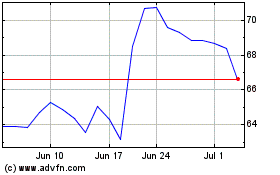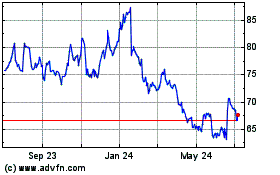UPDATE: Biotech Investors Shift Focus After Genzyme Deal
February 16 2011 - 5:48PM
Dow Jones News
French drugs giant Sanofi-Aventis SA's (SNY) acquisition of
Genzyme Corp. (GENZ) for at least $20.1 billion eliminates another
U.S. biotech firm from the scene and raises questions about where
portfolio managers invested in this space will now deploy their
capital.
The deal's official announcement early Wednesday ended months of
uncertainty since Sanofi began its pursuit of Genzyme last summer.
But analysts said that as short-term investors have swarmed to
Genzyme, fundamental biotech investors have been cycling out of the
stock for months and pursuing other options in anticipation of
further consolidation within the industry.
Fund managers invested primarily in biotech were in a similar
position in 2009 when Roche Holding AG (ROG.VX) acquired Genentech
for $46.8 billion. In that instance, some of the larger biotech
names like Amgen Inc. (AMGN), Celgene Corp. (CELG), Gilead Sciences
Inc. (GILD) and Biogen Idec Inc. (BIIB) saw their stocks rise
immediately after the deal was announced as capital flowed out of
Genentech and into those names.
But in 2011, the Sanofi-Genzyme deal amounts to less than half
of the value Roche paid for Genentech, meaning it will have a far
less impact on the entire biotech sector.
"At the end of the day, it isn't like $20 billion has suddenly
become available to be invested in biotechnology. It never happens
that way," said Orbimed Advisors partner Sven Borho, noting that
the shareholders have been moving away from the stock for a while
and the deal's price tag isn't large enough to lift the entire
sector.
"It gets spread pretty fast," he said, especially as many
Genzyme shares have been held by arbitrage players. Analysts said
fund managers over the past few months have been dividing their
money between the big names and some of the smaller companies for
months.
Orbimed is a health-care investment firm with about $5 billion
in assets under management, according to FactSet Research.
"I'm sure there are some dollars flowing out of Genzyme and into
Amgen," said Chris Raymond, an analyst at Robert W. Baird & Co.
"But for the typical fundamental health-care specialist investor,
you usually pay for growth. And the highest growth opportunity lies
in the mid-cap space."
Raymond said stocks like BioMarin Pharmaceuticals Inc. (BRMN)
and Alexion Pharmaceuticals Inc. (ALXN) have been big beneficiaries
from the available capital that has flowed out of Genzyme in recent
months. Upon completion of the deal, Human Genome Sciences Inc.
(HGSI) and Dendreon Corp. (DNDN) could benefit, but Raymond added a
shift of fund flows has largely occurred already.
"I'm expecting a whole lot of nothing," he said. "The deal has
been announced, but that flight into other names has already
happened."
Sanofi-Aventis said Wednesday that it had agreed to acquire
Genzyme for $20.1 billion plus a contingent value right in a deal
that will likely close early in the second quarter of this year.
The CVR, a pledge of future payment, could reach as much as $14 a
share depending on whether some of Genzyme's treatments reach
specific targets.
Some portfolio fund managers that invest primarily in biotech
are left wondering where to deploy their money once Genzyme is no
longer an option.
"If you're a health-care fund and you have to reinvest, then
some of these smaller biotech companies naturally could benefit,"
said Rajiv Kaul, a fund manager of Fidelity's Select Biotechnology
Portfolio (FBIOX), which has more than $1 billion in assets under
management, according to Morningstar. "This deal forces you to look
for new opportunities, and there are many companies with valuations
that aren't too bad."
As merger activity increases in health care, analysts believe
some smaller biotech companies are the next to benefit.
"A lot of bellwether names are getting picked off one by one,"
Raymond said. "There are pretty slim pickings in biotech.
Beneficiaries in recent history and going forward will be midcap
companies in very early stages of their growth trajectory."
Shiv Kapoor, an analyst at Morgan Joseph & Co., said
investors should turn more risk averse regarding midcap biotech
stocks. Midcaps offered the lowest risk with the best return over
the past couple of years, but it's an area that's "not as lucrative
as it once was," he said.
"There's going to be very few areas within biotech that people
can invest in," Kapoor said. "I'm expecting the money to spread
out. Some of it will end up in pharmaceuticals instead of biotech
because they are more diverse and have better value, which was the
appeal behind Genzyme."
-By Steven Russolillo, Dow Jones Newswires; 212-416-2180;
steven.russolillo@dowjones.com
--Thomas Gryta contributed to this report.
Gilead Sciences (NASDAQ:GILD)
Historical Stock Chart
From Jun 2024 to Jul 2024

Gilead Sciences (NASDAQ:GILD)
Historical Stock Chart
From Jul 2023 to Jul 2024
